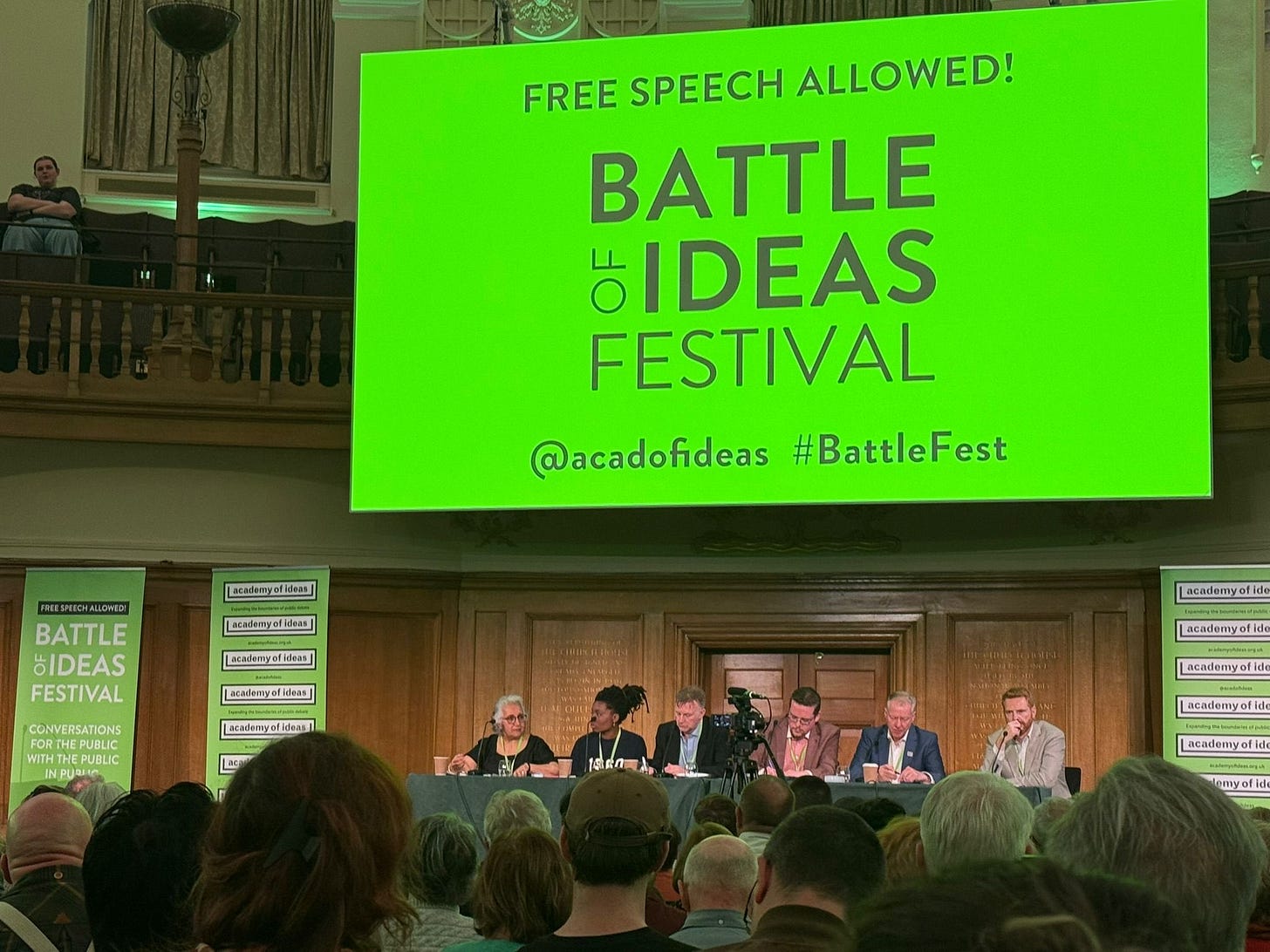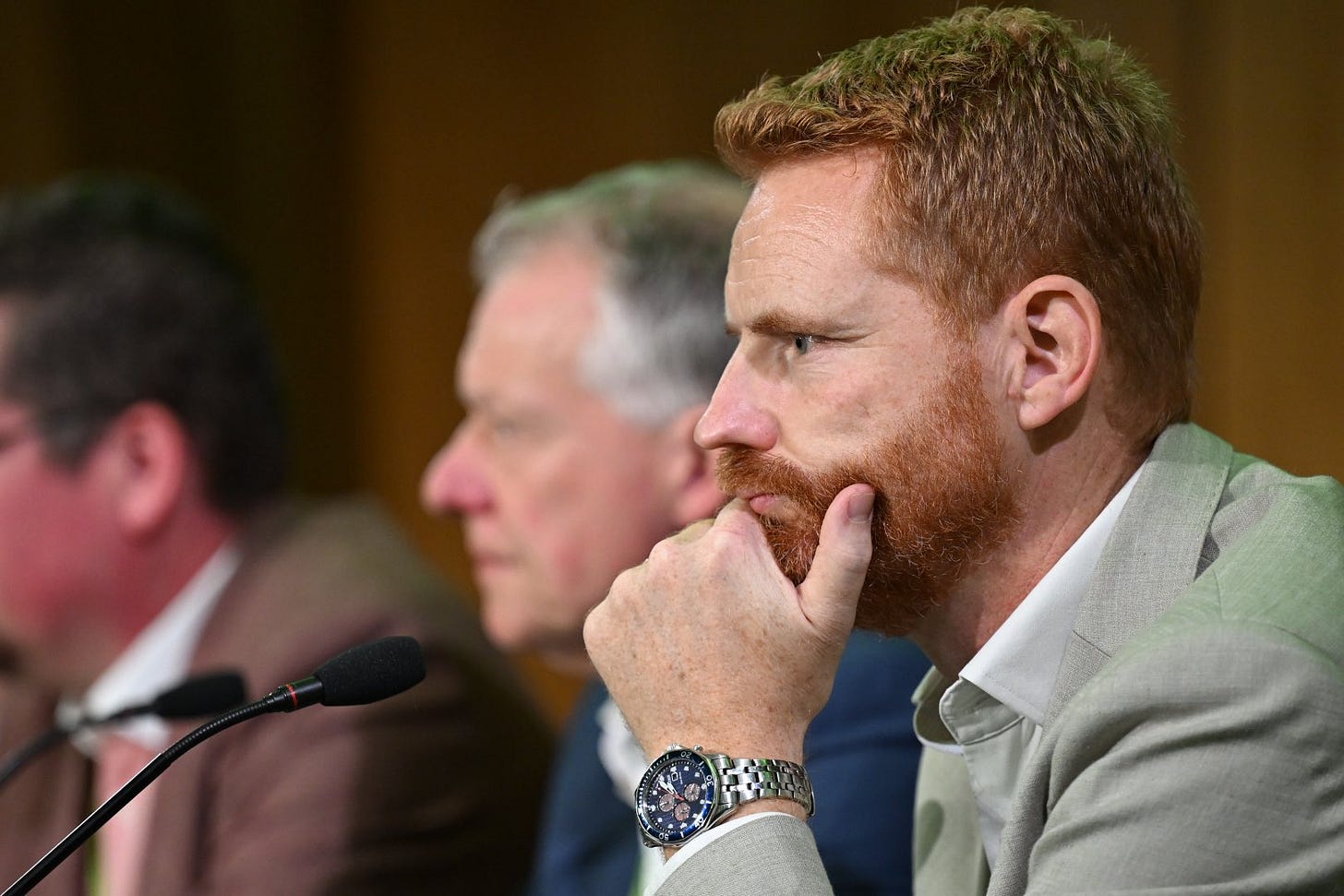Immigration and multiculturalism: my speech to the Battle of Ideas festival
At the weekend, I spoke in a debate on the themes of immigration, multiculturalism and integration at the Battle of Ideas festival in central London. The festival takes place annually and is organised by the Academy of Ideas.
The debate – entitled ‘Integration into what? Immigration and multiculturalism’ – was a keynote event at the festival and drew a substantial audience. Below is the text of my introductory comments. A lively and intelligent discussion – which included some well-spirited contributions from audience members – ensued. I believe that a video of the event will be available shortly, and I will endeavour to circulate it to my subscribers.
I am that rare thing: an active trade unionist and Labour party member who believes in regulation of the labour supply and isn’t a huge fan of state-sponsored multiculturalism. There aren’t many of us left, so enjoy me while you can!
Immigration, multiculturalism and integration are massive topics, and how we handle these things will determine the shape of our country for many years to come, perhaps irrevocably.
I start from the point that, in a free and open society, everyone must be at liberty to live their life as they please within the parameters of the law. People should be free in their personal lives to dress as they wish, worship the God of their choice, eat the food they want to eat, and so on. And the rest of us should be tolerant of those choices, even if they aren’t ones we would make personally.
This approach is what some people have described as ‘soft’ multiculturalism.
What I don’t believe in, but what I think we have now in Britain, is a top-down, state-sanctioned multiculturalism, where separateness and difference are actively promoted and encouraged, and where all cultures are regarded as being equally valid. This, I think, is a pernicious idea. It amounts to an imposed ideology – what some people call ‘hard’ multiculturalism – and I think it has proved incredibly divisive.
There is nothing wrong in a country having a dominant culture, regarding that culture as a general good, believing that it should take precedence over other cultures, resolutely defending it through public policy, and encouraging anyone coming into the country to be part of it.
In my experience, countries that take this approach tend to be more harmonious than countries that don’t. I often cite the example of Japan. Not a perfect country, by any means – no country is – but Japan is culturally homogenous, hasn’t over the years obsessed about promoting diversity and difference in the way that other major countries have done, controls its borders properly and defends its own culture unapologetically. Yet nobody could seriously argue that Japan is not a highly-civilised, safe, law-governed and well-ordered country that is broadly tolerant towards outsiders.
In Britain, we have taken the opposite approach, and I’m not sure in my lifetime that I’ve known our society be more fragmented. I think we are experiencing social disintegration on a rapid scale. We have been appalling at integrating newcomers. We like to say that we are a multicultural country, and there’s no doubt that we do promote hard multiculturalism; but, in fact, what we’ve ended up with are pockets of strict monocultures living parallel existences from each other and often not interacting, even when they are located in the same part of town.
What we’ve also seen more recently are outbreaks of communal sectarianism between some of these different cultural groups, and that’s a very worrying development.
Something else we’ve experienced in Britain is what Professor Eric Kaufmann has described as ‘asymmetrical multiculturalism’, whereby the indigenous population is told to celebrate every other culture, but any expression of its own culture is quite often frowned upon. Or where the indigenous culture is spoken about only in apologetic terms because of the country’s role in slavery or empire or whatever. Or, in the case of England, we are told by the liberal intelligentsia that the country has no distinct identity or culture at all.
These things anger people. They can see that it’s biased, and it jars with their sense of who they are and who their ancestors were. It’s just one of the reasons why there has long been a simmering resentment in many of our communities – especially our traditional working-class communities – and it’s a resentment that has occasionally exploded in such things as the Brexit vote.
We also need to challenge this mantra, trotted out ad nauseum by liberal politicians and commentators, that ‘Diversity is our strength’. In fact, it’s one of our greatest challenges. Just because you want something to be true, doesn’t mean it is true; yet these people recite the mantra like some incantation from a religion, knowing that if they keep saying it they’ll be welcomed into the Church of the Enlightened Progressives, or whatever it’s called.
The debate around multiculturalism must be seen in the context of the substantial increases in immigration levels over recent years. The two go hand in hand. If numbers are allowed to get out of control, as they clearly have, and if the new arrivals group together (as is perfectly understandable from their point of view) then there becomes less incentive to integrate. And that increases further the stresses on community cohesion and social solidarity.
And that term ‘social solidarity’ is such a key one. Harmonious, high-trust societies are rooted in it. In fact, most reputable studies show that the greater the degree of diversity within a society, the harder it is to achieve social solidarity, and in turn it becomes harder to get people to buy in to the concept of paying taxes, supporting a welfare state, and so on.
We should all abhor the idea that people should be treated less favourably on account of the colour of their skin. But race and culture are not the same. They overlap, but they are ultimately different.
I believe that public policy should unashamedly be geared towards the dominant culture, and decisions taken according to whether they help to sustain that culture or undermine it. Only then might we overcome the very profound social disintegration that has afflicted so many of our communities.
A reminder that you can follow me on X/Twitter: @PaulEmbery




An excellent speech, perfect, decent logic. So I bet most of it fell on stony ground. The Left (strings pulled by Soros & Co) actually WANTS disharmony and conflict - it certainly cannot bear to hear suggestions that western culture is demonstrably better than a lot of what we're importing.
Another well reasoned piece, thank you.
I fear it may too late now.
The Trojan Horse has disgorged sufficient numbers, and continues to do so with its water wings firmly in place, to make it nigh on impossible for the indigenous population to assert itself again without it getting very messy.
This horse has been hiding in plain sight for years, I’ve commented on this for years too but of course, I’m all of the things you mentioned.
I’m in my twilight years now so selfishly, hopefully, may not be drawn into the coming melee.
It’s our children and grandchildren that will suffer the consequences of these halfwit clowns that can’t see further than their big red squeaky noses…
If only ‘they’ were the first to suffer the consequence of their puppet masters commands… but as we all know, they’ll be fine, hiding in their ivory towers attempting to play us like a cacophony of failing orchestra conductors.
If Starmer and his rag day student intake are so convinced their majority gives them the mandate to make these dictatorial policies, I dare them to call another election….
Labour nil points, nada, nichts, zip!
Still…Onwards!!